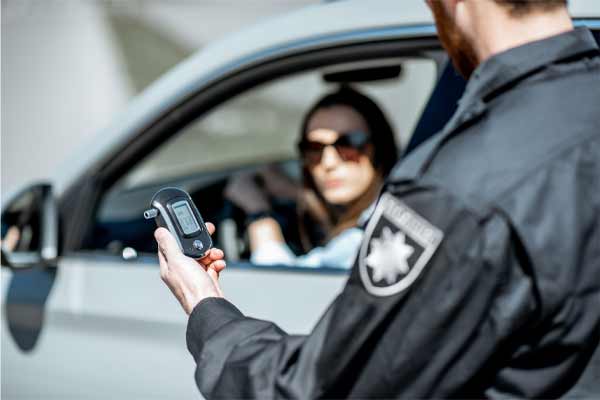Can You Legally Record Police Officers?
11/09/2025
DUI conviction with no chemical test? When a law enforcement officer suspects a person is driving are under the influence of alcohol or drugs, they’ll pull them over. The police officer will then request the driver take a chemical test or perform a series of field sobriety tests to see if their blood alcohol level is above the legal limit allowed to drive a car.
In Illinois, you can refuse to take a breathalyzer test. However, you’ll still face harsher penalties for refusing chemical testing. Many people don’t realize that criminal penalties related to refusal can be just as harsh as those for drunk driving. A person who refuses to take a breathalyzer test may still face drunk driving charges.
However, drivers may still have a strong defense, and there are several ways to beat the charge in Illinois courts. Here, you need a reputable criminal defense lawyer on your side to help you fight a breathalyzer refusal charge.
At Ktenas Law, our experienced Chicago criminal defense lawyers have the resources and expertise that you need to fight your DUI criminal charges. We understand how challenging a drunk driving arrest, and DUI refusal criminal charge can be. Our dedicated legal team has decades of experience in defending the criminally accused. For reliable legal counsel or more information, contact our criminal defense law firm today at (312) 756-8652 for your free initial consultation with an experienced attorney.
In some states, refusing to submit to chemical testing has severe consequences that include loss of driving privileges. A mandatory driver’s license suspension and installation of a breath alcohol ignition interlock device are additional consequences for a first-time DUI offense in every state today when one is convicted for a breathalyzer test refusal.
If a driver is subsequently charged with driving under the influence, a potential jail sentence might be a more severe penalty. For example, a first-time DUI offender in Illinois faces driver’s license suspension for one year and, if convicted, the DUI offender must serve a minimum jail time of 365 days. For a second DUI offense within 20 years, the person will face a license suspension period of five years.

Refusing to take a breath test during a drunk driving arrest takes one of two forms. One the person refuses to blow into the breathalyzer machine, or blows into it but doesn’t blow hard enough because of a medical condition or intentionally. They’ll lose their driver’s license, but if the person is found guilty of intoxicated driving, the judge typically dismisses the charge for refusing to take the breath test. Fighting to avoid a driver’s license suspension is the first step towards getting a breath test refusal dismissed in court and preventing the harsh consequences that take effect soon after getting charged with refusing a breathalyzer test offense.
Most people refuse to take breath testing because they think that their blood alcohol concentration exceeds the legal limit. Though the loss of license will follow, you can avoid jail time if you hire a skilled attorney to fight the charge. If there isn’t sufficient evidence to make a drunk driving or drugged driving charge stick, the offender can avoid a jail sentence.
Knowing a reputable DUI criminal defense lawyer comes in handy, especially after refusing a breathalyzer test. Experienced DUI defense attorneys at Ktenas Law will review the breathalyzer refusal offense and help you fight and win a DUI case with no breath test in court. If additional evidence is lacking, or there’s room for reasonable doubt, our legal team can help you get the case dismissed.

Contrary to what many people may think, yes, you can be convicted of driving under the influence of alcohol or drugs without a breath test. That’s because a breathalyzer test is not the only way for the arresting police officer to establish whether you were driving under the influence of drugs or alcohol.
If you decide to refuse to take a breath test after being pulled over at a traffic check, the police officer would likely request you to perform field sobriety testing instead and investigate the scene for additional evidence that your blood alcohol content may be above the legal limit.
Other evidence can prove you were driving under the influence, including:
In every driving under the influence case, the best chance of the prosecution winning their case against an individual rely on the blood alcohol content test results from blood or breathalyzer test results. For drunk drivers that took a breathalyzer test and blew over the legal limit of 0.08 in Illinois, they’re likely to be found guilty of DUI and their test results will be used as evidence against them in court.
However, when fighting a DUI case that has no blood or breath test results to use as evidence, the prosecutor can only use the police report of their observations to go on. When it comes down to the prosecution proving a drunk driving case, the odds of beating a driving under the influence case with no blood alcohol test results are always in a driver’s favor based on reasonable doubt with no solid blood alcohol concentration evidence to prove the guilt of a drunk driving criminal offense.
The probability of getting out of a first DUI offense is higher even when there are no breath test results to use against a person in court, but identifying the best legal strategy that works is essential to the likelihood of winning.
If you’re facing criminal charges for refusing to take a DUI breath test, it’s essential that you contact a criminal defense attorney immediately. With decades of combined experience, the skilled DUI criminal defense attorneys at Ktenas Law have helped many DUI offenders successfully beat DUI refusal charges in Illinois.
Contact our criminal defense law firm today at (312) 756-8652 to learn what legal options are available for you.

